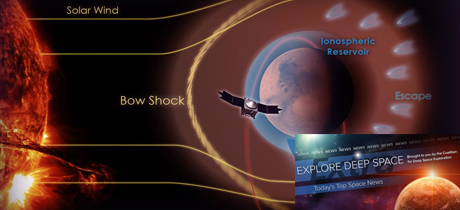In Today’s Deep Space Extra… James Webb Space Telescope launch slips four days to December 22. Hubble continues to recover from its latest glitch.
Human Space Exploration
Russia ready to support China in lunar station project, says top senator
TASS of Russia (11/23): Plans by Russia to join with China to establish an International Scientific Lunar Station has won legislative support from the speaker of the upper house of Russia’s parliament. News of the potential for a cooperative effort by the two countries to cooperate in scientific activities at the Moon emerged earlier this year. (Editor’s note: TASS is a Russian government-owned news source).
Space Science
JWST launch slips 4 days due to processing accident
Coalition Member in the News – Northrop Grumman
Spacepolicyonline.com (11/22): The target launch date for the James Webb Space Telescope (JWST) from French Guiana has slipped from December 18 to December 22 due to the unexpected release of a clamp that generated vibrations as the observatory was being mated to its Ariane 5 rocket, NASA said Monday. The slip will provide time for damage assessments.
NASA counts down to first test of “planetary defense” against asteroids
CBS News (11/23): Favorable weather is forecast as NASA prepares for the launch early Wednesday of the Double Asteroid Redirection Test (DART) mission, the unprecedented demonstration of an impact strategy for changing the course of an asteroid from destructively striking the Earth. Launch is planned for 1:20 a.m. EST from Vandenberg Space Force Base. The DART spacecraft will rendezvous with Didymos, a binary asteroid with a moonlet known as Dimorphous. DART’s goal is to autonomously impact the moonlet between September 26 and October 1, 2022. Changes to the orbit of the object will be studied to assess how effective a kinetic impact planetary defense strategy might be.
Hubble Space Telescope team revives powerful camera instrument after glitch
Space.com (11/22): NASA science teams have revived a second major instrument aboard the Hubble Space Telescope, which experienced a problem in late October with synchronization of its internal messaging, causing all five of its main scientific instruments to go into a protective “safe mode.” The Advanced Camera for Surveys was recovered on November 7. The Wide Field Camera 3 was recovered on Sunday and expected to resume science operations today.
Scientists propose jumpstarting Mars’ magnetic field to make it habitable
Futurism (11/21): Finding a means of enhancing a weak magnetic field at Mars could help to make the Red Planet habitable by humans, according to scientists who are preparing a study on the prospect for publication in the January edition of Acta Astronautica. A strong magnetic field would enable the neighboring planet to constrain an atmosphere.
Opinion
After another ASAT test, will governments finally take action?
The Space Review (11/22): Space Review editor Jeff Foust notes the outrage expressed worldwide in the wake of Russia’s November 15 anti-satellite test and questions the ability to prevent such tests in the future. “Without consequences for that debris-producing act, there may be little to restrain Russia or China, or other nations, from performing more tests and increasing the hazard to satellites and crewed spacecraft in low Earth orbit.” The author adds that “the time may be for governments to take more serious efforts to address the growth of orbital debris generally, and more specifically take steps to discourage ASAT tests like this in the future.”
Other News
Voyager Space acquired majority stake in Space Macro
Coalition Member on the News – Nanoracks
SpaceNews.com (11/22): Voyager Space Inc. is acquiring a majority stake in Space Micro Inc. as part of a deal designed to help the San Diego-based supplier of space electronics and satellite components expand operations to meet demand. Space Micro is the sixth acquisition by Voyager, which previously acquired Valley Tech Systems, Nanoracks, The Launch Company, Altius Space Machines and Pioneer Astronautics.

